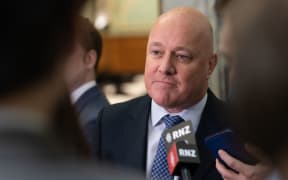
More non-essentials will fall by the wayside if mortgage repayments climb, a homeowner has told RNZ. Photo: 123RF
Economic stress is taking its toll on the housing sector, with mortgage brokers concerned potential repayment increases will significantly stretch household budgets.
It's predicted the Reserve Bank will keep lifting the official cash rate, with latest inflation figures showing price rises are not easing.
Homeowner Sara Ruffell said further rates increases would cause serious pain to the pocket.
"We've only been in our current home since the start of June so we are fixed until May on 4.75 percent but I have definitely been keeping a close eye on the OCR and the changes to the interest rate. If they stay as they are we are going to be looking at an extra $100 a week on our mortgage."
An increase in her mortgage repayments would also raise stress levels in the household.
"If you add on another 100 [dollars] per week in mortgage repayments, it's at the point where we have to start looking at where we take that money from."
Sacrifices would need to be made, she said.
"It's going to be things like when we go to the supermarket we are going to have to have a set budget and a meal plan for the week."
Further increases would mean more non-essentials falling by the wayside.
"We've got three kids; we are going to have to look at restricting the sporting and extra curricular activities they want to do. Money is not endless."
Ruffell said her whānau were looking at alternatives such as tiny homes.
"We both work full time. I think we will definitely be struggling, it will be harder for us for sure."
Home Owners and Buyers Association of New Zealand president John Gray said he was seeing a perfect storm of rising interest rates and falling sales.
"There is huge anxiety amongst home owners facing significant increases in mortgage repayments. A lot of them would be otherwise considering selling to ease the pain but of course it is a difficult time to sell as well."
Many home owners were actually in a negative equity situation, Gray said.
"A lot of the value is being lost in existing properties that have mortgages over them, and we have certainly seen members significantly suffer as a result of the falling values."

It's a difficult time to sell a property, an expert says. Photo: RNZ / Angus Dreaver
Inflation's flow-on effect feared
Mortgage advisor Bruce Patten said the biggest issue for homeowners was that inflation has remained higher than expected.
"Which means it's likely rates will go higher than expected and the flow-on effect is going to be more costs for all mortgage holders really, right across the board."
He had been fielding a number of inquiries from clients about when they should fix ,but that was like asking the length of a piece of string.
"If you've got good affordability and you can afford to fix for 12 or 18 months you may find they are having to unwind some of these interest rate increases. We are suggesting mid-2024 so it's just how you handle this additional cost for the next 12 to 24 months."
Patten believed the housing market would become more subdued in the coming months.
"You know there is not that speculative element to the market, you haven't got people buying houses, doing them up and flicking them on. So there is certainly not that turnover we have seen in the last two years so I expect it will stay the same for the next year at least."
Many people with a fixed loan would be coming off it soon and may not feel the pain for six months or so, Patten said.

File pic Photo: RNZ / Nate McKinnon
With the traditional route to home ownership out of reach many were taking alternative paths.
Amy Stevens is the founder of Slice, a shared home ownership platform which helps facilitate first home buyers' entry to the market.
"I bought with my partner at the beginning of this year and because I own with someone else I am less concerned in that together we are quite comfortably able to service what we have taken on in terms of lending," Stevens said.
With shared home ownership, a rise in mortgage payments was less daunting, she said.
"Putting that money into a mortgage that yes may be costing more is at least an investment as opposed to rent which is also increasing as a result of inflation."
Joint home ownership could mean fewer lifestyle sacrifices, Stevens said.
"It meant we were able to buy a property we both wanted in a location we wanted and still have that avocado on toast and feel comfortable about the repayments we are making."
Her business helped alleviate barriers to home ownership.
"It helps get people on the ladder by supporting them to buy with family, a partner, friends or even an investor. We are just trying to help those who feel ownership is out of reach, or have been saving for a long time but cant get that $200,000 deposit."
Mortgage expert Mike Whittaker said a lack of disposable income was preventing first home buyers from getting on the market.
"Inflation doesn't seem to be the major problem for people to buy houses, it's the lack of 90 percent lending, we are turning four to five away a day because they just don't have the 20 percent deposit."
He believed bureaucracy was proving a barrier to home ownership.
"I would like to see more 90 percent lending, the banks just aren't doing any of it really. We have been 20 percent deposits now for nearly a year and there is hardly any 90 percent lending and the banks just can't because of restrictions from the government."
Whittaker said home owners with 10-plus-year mortgages would struggle with a rates increase.
Financial Paramedic Jeff Royle said times were harsh in lender land.
"My take on the CCCFA [Credit Contracts and Consumer Finance Act] is Crippling Consumer Confidence Finance Act. It is really bad for first home buyers."








